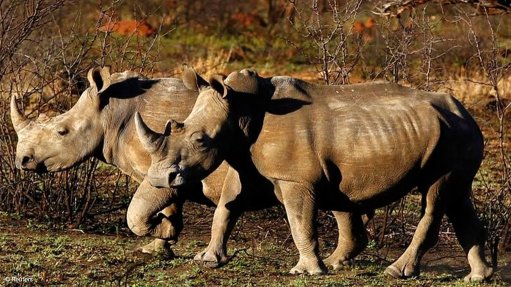Tackling S Africa’s plastic waste crisis through art
Researchers from the University of Portsmouth’s Revolution Plastics team and the Mpumalanga Department of Agriculture, Rural Development and Environmental Affairs partnered with UK-based charity WasteAid to pioneer the Masibambisane pilot study to divert 7 t of plastic waste, changing behaviours through art and practical measures in the Thembisile Hani local municipality, in Mpumalanga.
The University of Portsmouth's team played a crucial role in designing a “creative sensitisation campaign” to support the pilot scheme, collaborating with local stakeholders including artists, musicians and waste collectors. The campaign aimed to demonstrate the value of waste and raise awareness about the harmful impacts of dumping and burning waste on human health.
The feasibility study was funded by the Waste and Resources Action Programme (WRAP) and UK Research and Innovation International Circular Plastics Competition, and was aiming to address plastic waste collection challenges in specific geographies.
University of Portsmouth Revolution Plastics deputy director Dr Cressida Bowyer says, “sensitisation is a vital process for educating communities, raising awareness and inspiring behaviour change. To make messaging more effective, it’s important for the message creators to reside in the target community, understand local social and cultural contexts, and actively participate in the production of campaign materials.”
Embracing arts-based sensitisation methods such as murals, music and street theatre skits, the campaign was accessible to old and young alike, making the messages easily comprehensible and encouraging open discussions.
Two murals created in the project area featured a clear graphical guide aiding in recycling efforts and encouraging the separation of recyclables at source. The murals, adorned with vibrant Ndebele patterns, “resonated with the local culture, effectively communicating the different types of plastics and other recyclable materials suitable for recycling”.
Recognising the power of music as a driver for social change, a locally crafted song was composed and performed by talented local waste pickers and musicians, tapping into the emotional resonance that music brings.
The “catchy chorus and captivating video” showcasing the murals, theatre skits and community events reinforced the campaign’s core messages, while the lyrics and performance reflected the pride that the waste collectors have in their work.
The study employed creative ways to educate people about the dangers of dumping and burning waste with on-the-ground action to increase waste recycling including supporting informal waste collectors and introducing community drop-off points for recyclables.
WasteAid implemented strategies by working closely with the local community, to enhance plastic waste collection and boost the revenue for local collector groups.
The pilot study has made promising strides in combating the problem of plastic waste, with two-thirds of local people reporting a positive change in their environment as a direct result of the project.
A survey of local residents showed that arts-based methods – in particular the creation of murals – were significant drivers in the success of the project. Murals sensitised 86% of those who saw them on how to separate waste, changing the attitudes and behaviours of 80% of those who saw them. By the end of the project the amount of waste managed by burning or dumping had fallen by 27.7%.
The uncontrolled disposal of plastic waste in the area poses a severe threat to the environment and human health, with waste often burned, contributing to climate change and poor air quality.
The project focused on both supply-side factors, such as educating households on better waste separation and providing collection bins, as well as demand side factors, including training collectors on the types of plastics with value and promoting good business management.
Additionally, the project facilitated connections with off-takers committed to purchasing plastic waste regularly from collectors.
WasteAid CEO Ceris Turner-Bailes elaborates, “This is a great example of the positive outcomes that can be achieved through collaboration between the [public] sector, academia, and the private sector. The educational and creative elements for this project made it almost impossible for people in the community to ignore our initiative. It sparked interest and helped facilitate important discussions on the steps people could take to improve waste collection and increase recycling.”
Community-based participatory research was integral to the design and implementation of these creative interventions by engaging with local creatives and waste collectors as equal partners ensured the campaign was ethically and contextually relevant.
The campaign showed promising results in just a short period of time. Nearly 21% of the community members surveyed now use the community bins for better waste separation and segregation. Two-thirds of the respondents noted a positive change in their environment, with nearly half attributing the transformation to the presence of community bins.
Article Enquiry
Email Article
Save Article
Feedback
To advertise email advertising@creamermedia.co.za or click here
Press Office
Announcements
What's On
Subscribe to improve your user experience...
Option 1 (equivalent of R125 a month):
Receive a weekly copy of Creamer Media's Engineering News & Mining Weekly magazine
(print copy for those in South Africa and e-magazine for those outside of South Africa)
Receive daily email newsletters
Access to full search results
Access archive of magazine back copies
Access to Projects in Progress
Access to ONE Research Report of your choice in PDF format
Option 2 (equivalent of R375 a month):
All benefits from Option 1
PLUS
Access to Creamer Media's Research Channel Africa for ALL Research Reports, in PDF format, on various industrial and mining sectors
including Electricity; Water; Energy Transition; Hydrogen; Roads, Rail and Ports; Coal; Gold; Platinum; Battery Metals; etc.
Already a subscriber?
Forgotten your password?
Receive weekly copy of Creamer Media's Engineering News & Mining Weekly magazine (print copy for those in South Africa and e-magazine for those outside of South Africa)
➕
Recieve daily email newsletters
➕
Access to full search results
➕
Access archive of magazine back copies
➕
Access to Projects in Progress
➕
Access to ONE Research Report of your choice in PDF format
RESEARCH CHANNEL AFRICA
R4500 (equivalent of R375 a month)
SUBSCRIBEAll benefits from Option 1
➕
Access to Creamer Media's Research Channel Africa for ALL Research Reports on various industrial and mining sectors, in PDF format, including on:
Electricity
➕
Water
➕
Energy Transition
➕
Hydrogen
➕
Roads, Rail and Ports
➕
Coal
➕
Gold
➕
Platinum
➕
Battery Metals
➕
etc.
Receive all benefits from Option 1 or Option 2 delivered to numerous people at your company
➕
Multiple User names and Passwords for simultaneous log-ins
➕
Intranet integration access to all in your organisation


















